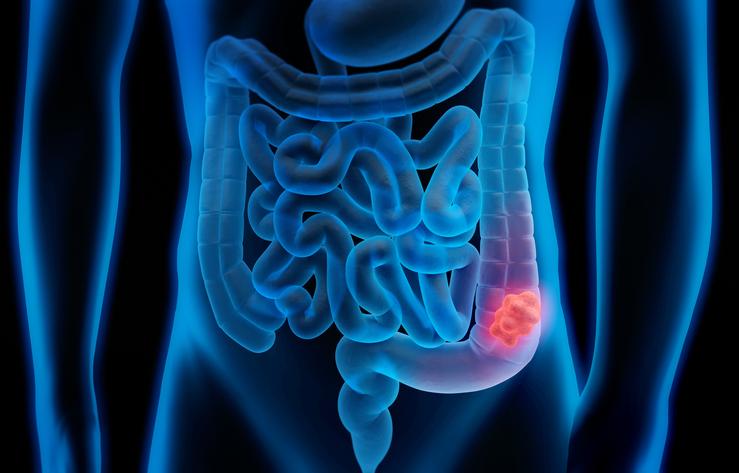
Wie wird auf Darmkrebs gescreent?
Peer reviewed by Dr Krishna Vakharia, MRCGPAuthored by Ellie BroughtonOriginally published 10 Nov 2022
- HerunterladenHerunterladen
- Teilen Sie
Teilen Sie
Nach dem Tod von Dame Deborah James sprechen Dr. Kevin Monahan und Dr. Lisa Wilde über fäkale immunchemische Tests - die Untersuchung auf Blut im Stuhl - und andere Arten der Darmkrebsvorsorge. Dazu gehört auch das Lynch-Syndrom, eine Erbkrankheit, die das Risiko für bestimmte Krebsarten einschließlich Darmkrebs erhöht.
In diesem Artikel:
Lesen Sie unten weiter
What is bowel cancer?
Bowel cancer is a catch-all term for any cancers in the colon or rectum - sometimes called colorectal cancer. It affects around 43,000 people a year in the UK and is the fourth most common type of cancer.
The five most common symptoms of bowel cancer:
Blood in your poo or bleeding from your bottom.
A persistent and unexplained change in your bowel habits.
Ungeklärter Gewichtsverlust.
Extreme, unexplained tiredness.
A pain or lump in your abdomen - general tummy area.
Patientenauswahlen für Darmkrebs

Krebs
Why bowel cancer screening is so important
Bowel cancer is the fourth most common cancer in the UK, with more than 41,000 people diagnosed - and 16,000 dying from the disease - every year. The number of deaths from bowel cancer is in decline, largely thanks to the national screening programme, which targets people aged 60 to 74 in England and invites them to do a home screening test every two years.
von Allie Anderson

Krebs
Darmkrebs
Dickdarm- und Enddarmkrebs (auch kolorektales Karzinom genannt) sind im Vereinigten Königreich weit verbreitet. Der Dickdarm und das Rektum sind Teile des Darms. Die meisten Fälle treten bei Menschen über 50 Jahren auf. Wenn Darmkrebs in einem frühen Stadium diagnostiziert wird, bestehen gute Heilungschancen. Je weiter der Krebs fortgeschritten ist (je mehr er gewachsen ist und sich ausgebreitet hat), desto geringer sind im Allgemeinen die Heilungschancen. Allerdings kann eine Behandlung das Fortschreiten des Krebses oft verlangsamen.
von Dr. Doug McKechnie, MRCGP
What is screening?
The NHS routinely screens everyone between 60 and 74, and since 2021 has also begun inviting everyone aged 50 to 59.
Faecal immunochemical testing (FIT)
The NHS sends people a home test kit, known as a faecal immunochemical test (FIT). You use the kit to collect a tiny sample of poo.
In the lab, samples are checked for blood, further screening tests will then diagnose whether or not the person has bowel cancer.
Dr Kevin Monahan is a consultant gastroenterologist at St Mark's in London, and was a lead author on essential new guidance for GPs on FIT testing1.
"Patients are facing significant delays and we're struggling to identify those patients who are most likely to require investigation," he says. "We want to be more accurate in how we can offer investigations because symptoms on their own are a rather crude way of identifying patients with bowel cancer.
"If we add FIT, we have an objective measure that can say, 'These are the people who most likely need to be investigated'. The doctor explains that whilst FIT may not be 100% certain, it is a very good test.
Dr Lisa Wilde, director of research and external affairs at Bowel Cancer UK, says FIT testing is particularly good at ruling out bowel cancer quickly for patients under 50. Only 6% of diagnoses are in people under 50, so although doctors are looking for it, they know it's rare2.
"It's entirely possible for a GP to go through their entire career without necessarily seeing a person under 50 with bowel cancer," Dr Wilde explains. "We want bowel cancer ruled out quickly for people, especially in that younger group - which is small but growing."
Lesen Sie unten weiter
Who can have bowel cancer screening?
Anyone can seek a referral if they have noticed one of the symptoms, and people in England aged 58 to 74 can take part in screening without symptoms.
How does bowel cancer screening work?
How often are people screened for bowel cancer?
The national bowel cancer screening programme writes to people in the at-risk age group every two years.
Lynch syndrome
Some people are at greater risk of certain types of cancer, including bowel cancer, because they carry a genetic disposition known as Lynch syndrome.
All people who have this syndrome are offered a colonoscopy - camera test to check for colon cancer.
Lesen Sie unten weiter
Has bowel cancer screening been suspended?
No, bowel cancer screening has not been suspended. After being paused at the start of the COVID pandemic, routine screening had returned across the UK by December 20203.
Does bowel cancer show up in blood tests?
Yes, some patients might be offered a test to find 'tumour markers' in your blood.
Can a CT scan detect bowel cancer?
Yes, after an endoscopy patients may be recommended a CT scan to further investigate bowel cancer.
How is bowel cancer diagnosed?
Bowel cancer is usually diagnosed after endoscopy.
For information about the bowel cancer screening programme, please contact your local screening service:
England: 0800 707 6060
Northern Ireland: 0800 015 2514
Scotland: 0800 012 1833
Wales: 0800 294 3370
The Macmillan Support Line can help with clinical, practical and financial information about a cancer diagnosis. Call 0808 808 0000, 8 am-8 pm any day of the week.
The Cancer Research UK nurses line can be reached on 0808 800 4040, Monday to Friday 9 am-5 pm.
Weitere Lektüre
Artikel Geschichte
Die Informationen auf dieser Seite wurden von qualifizierten Klinikern geprüft.
10 Nov 2022 | Originally published
Verfasst von:
Ellie Broughton
Peer-Review durch
Dr. Krishna Vakharia, MRCGP

Fragen, teilen, verbinden.
Stöbern Sie in Diskussionen, stellen Sie Fragen, und tauschen Sie Erfahrungen zu Hunderten von Gesundheitsthemen aus.

Fühlen Sie sich unwohl?
Beurteilen Sie Ihre Symptome online und kostenlos